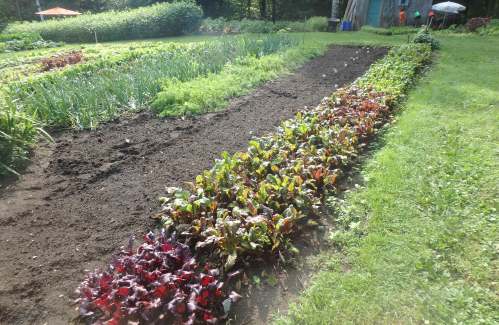I have grown vegetables organically all my life. I do not use chemical fertilizers or pesticides. I don’t often think about the reasons why I do it, more than I think about breathing; It’s just something I do
I recently picked up a book by Maria Rodale called The Organic Manifesto: How Organic Farming Can Heal Our Planet, Feed the World, and Keep Us Safe (Rodale Press, 2010) and it reminded me why I do it. I would like to share with you some of the important points.
In the introduction, Eric Schlosser (author of the fabulous book Fast Food Nation) presented some raw facts: American farmers use 1.2 billion pounds of pesticides each year, 4 pounds for every man, woman and child. Some of these pesticides, the organophosphates, were first developed in Germany in World War II as chemical weapons. Usage reporting is not required by the federal government and testing is done by manufacturers, not the EPA or USDA. Most foods have pesticide residues, except organic foods, which shouldn’t have any.
One of Maria Rodale’s reasons for eating only organic food may surprise you: it has to do with climate change. Soils treated with chemicals, including fertilizers, do not have robust populations of microorganisms. Organic soils do. Among these living things, the key is the mycorrhizal fungi that cover the roots of plants in organically cared for soils. These fungi sequester large amounts of carbon, extract greenhouse gases from the atmosphere, and retain them in the soil. But they are practically non-existent in soils treated with chemicals. Grow organically? Eat organically? You are helping the environment.
Second, irrigation water for commercial agriculture, especially in the West, uses large amounts of water, depletes aquifers, and pollutes groundwater. When I traveled through the Midwest in the early 2000s, I was surprised that supermarkets designated entire aisles for pitchers of water; no one wanted to drink from their own wells. And there is a dead zone in the Gulf of Mexico that is larger than New Jersey caused by agricultural runoff of chemicals from conventional fields.
Children are particularly vulnerable to chemicals used in commercial agriculture. Rates of childhood cancer, asthma, diabetes, autism, and other debilitating conditions continue to rise. Ms. Rodale attributes (with abundant footnotes to scientific studies) many of these changes to the chemicals children consume. As she says, “Cheap food equals high health care costs.”
The “organic” label on food also means that genetically modified organisms were not used to make your food. In 2010, when Rodale wrote the book, 91% of all soybeans and 95% of all corn produced in the United States was genetically modified to be tolerant of a herbicide called glyphosate, sold under the trade name “Roundup.”
There has been a lot of controversy about Roundup and whether it is harmful to humans. Ms. Rodale points out that Roundup cannot be washed from food – it has a surfactant that allows the chemical to penetrate the cell wall. And since corn and soy are used to make so many foods, from ice cream to baby food to tomato sauce, it’s everywhere. The federal government does not consider Roundup to be a problem, although many scientists do.
Not once did Ms. Rodale in this book criticize conventional chemical farmers. Organic or conventional, they recognized their hard work and desire to work their land and provide for their families. She recognizes that the transition to organic farming takes time, money, and education.
So what can you do? You may not be able to afford to buy anything but organic food. But you can probably buy your meats from local farmers who don’t use the midwestern feedlots that feed their cows and pigs antibiotics. And you can get eggs, like me, from a local teenager who treats his chickens well. (Thanks Ian Eggs).
In the case of vegetables, you can probably grow some of what you need for vegetables in the summer or buy from a local farm stand. Many farmers are happy to tell you how they grow their vegetables. The provider of the local farm stand near me, Edgewater Farm, uses an approach called IPA or Integrated Pest Management. This method encourages farmers to use natural controls and to use pesticides only when a crop is threatened. They grow crops to kill weeds instead of spraying herbicides like Roundup.
But the bottom line is this: the more you grow organically, the better your soil will be. By using only organic methods, you can avoid many chemicals in your food that could be present in grocery store foods.
I recognize that I cannot change the world with what I do. But I have learned to grow a lot of vegetables and to preserve them to eat out of season. So think about a bigger garden this summer, and I’ll tell you how to prepare food for next winter when the time comes.
Henry can be reached at henry.homeyer@comcast.net or PO Box 364, Cornish Flat, NH 03746. Henry’s book, Organic Gardening (not just) in the Northeast: A Hands-On, Month-by-Month Guide has It has been reprinted and is now available with it for $ 19 including shipping.

